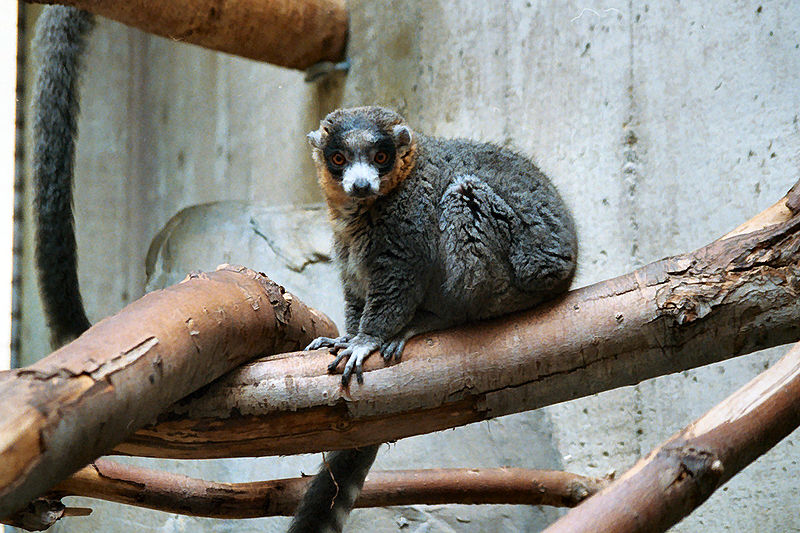Post by Deinobrontornis on Dec 6, 2011 18:29:16 GMT -5
[a href="Mongoose Lemur - Eulemur mongoz"]Mongoose Lemur - Eulemur mongoz[/a]

The mongoose lemur (Eulemur mongoz) is a lemur ranging from 12 to 18 inches long plus a tail of 16 to 25 inches. The mongoose lemur lives in dry deciduous forests on the island of Madagascar as well as in the humid forests on the islands of the Comoros. This makes the Mongoose Lemur one of only two lemurs found outside of Madagascar, though it is believed to be an introduced species in the Comoros. The mongoose lemur mostly eats fruit, though flowers, leaves and nectar also make up part of its diet. As such, mongoose lemurs act as both pollinators and seed dispersers, but may use the nectar of the kapok tree for nearly 80% of their diet in some parts of their range during the dry season. Feeding on grubs and beetles has also been observed. They are unusual among primates in that they will be diurnal or nocturnal depending on the season, being more active during the day in the wet season and changing activity to the night during the hotter dry season.
Both sexes are born with white beards, but become obviously dimorphic at about six weeks of age when the males develop red beards and red cheeks. The males also have lighter faces than the females. Males may further distinguish themselves when scent-marking territory, as they occasionally develop a bald patch on top of the head from rubbing.
Mongoose lemurs are arboreal, with the ability to jump several meters from one tree to another. They live in small family groups, usually consisting of a bonded pair and 1 to 3 offspring. These groups rarely encounter one another, but when they do, they are aggressive. Young are born just prior to the rainy season, from August to October. Gestation lasts approximately four months and weaning takes place around five months after the young are born. The offspring then usually stay with their parents until three years of age, when they have reached full maturity.
Captive mongoose lemurs can live up to 26 years, while wild specimens live 18–20 years.



The mongoose lemur (Eulemur mongoz) is a lemur ranging from 12 to 18 inches long plus a tail of 16 to 25 inches. The mongoose lemur lives in dry deciduous forests on the island of Madagascar as well as in the humid forests on the islands of the Comoros. This makes the Mongoose Lemur one of only two lemurs found outside of Madagascar, though it is believed to be an introduced species in the Comoros. The mongoose lemur mostly eats fruit, though flowers, leaves and nectar also make up part of its diet. As such, mongoose lemurs act as both pollinators and seed dispersers, but may use the nectar of the kapok tree for nearly 80% of their diet in some parts of their range during the dry season. Feeding on grubs and beetles has also been observed. They are unusual among primates in that they will be diurnal or nocturnal depending on the season, being more active during the day in the wet season and changing activity to the night during the hotter dry season.
Both sexes are born with white beards, but become obviously dimorphic at about six weeks of age when the males develop red beards and red cheeks. The males also have lighter faces than the females. Males may further distinguish themselves when scent-marking territory, as they occasionally develop a bald patch on top of the head from rubbing.
Mongoose lemurs are arboreal, with the ability to jump several meters from one tree to another. They live in small family groups, usually consisting of a bonded pair and 1 to 3 offspring. These groups rarely encounter one another, but when they do, they are aggressive. Young are born just prior to the rainy season, from August to October. Gestation lasts approximately four months and weaning takes place around five months after the young are born. The offspring then usually stay with their parents until three years of age, when they have reached full maturity.
Captive mongoose lemurs can live up to 26 years, while wild specimens live 18–20 years.




